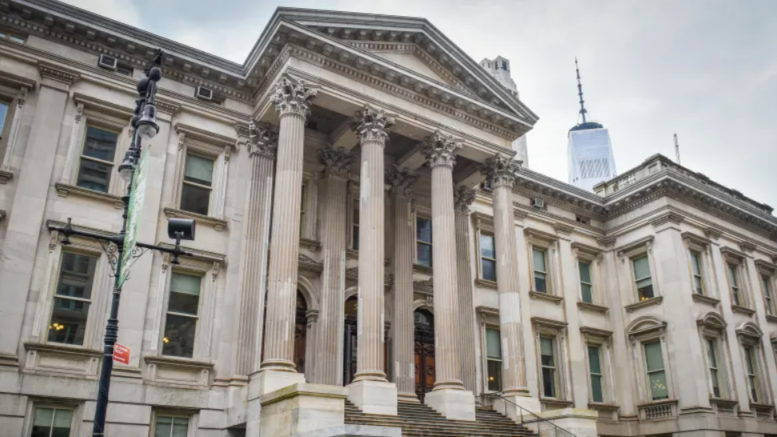Following a stunning rejection last month, New York City’s education panel approved Wednesday the city’s school funding formula for next year, as Schools Chancellor David Banks promised to create a group that will review the 15-year-old formula.
The commitment from the city followed concerns from some panel members and public school advocates who want the current funding formula to provide more support for additional groups of high-needs students, such as students living in temporary housing.
The panel voted 12-1, with an additional abstention, to approve the formula, known as Fair Student Funding. The 15th member, a Staten Island borough appointee, quit last month. Chancellor David Banks said he, too, supports a more equitable formula, calling it a “horrible and ridiculous” situation that he inherited from previous administrations. He said he would put in writing his commitment on a working group.
But Banks, who called last month’s vote “deeply disappointing,” said schools could not afford a delay in getting their budgets if the formula was rejected again. Receiving a delayed budget could hamper hiring decisions, making it tougher to plan out classes for next year — an issue schools faced over the past two school years as the pandemic wore on, officials said.
“Passing it tonight does not mean that this is a chancellor who doesn’t give a damn — quite the opposite,” Banks said. “I have to keep the system moving.”
Officials had planned to get budgets to schools this month before the panel’s rejection in April. After Wednesday’s approval, it was not immediately clear when schools would receive their budgets.
Each year, department officials ask the Panel for Educational Policy (PEP), composed mostly of mayoral appointees, to reapprove the funding formula. The formula accounts for $10 billion in funding and 65% of school budgets. It is structured to send more money to schools that are struggling academically, as well as those with higher shares of students with disabilities and English language learners.
But after hearing from public speakers last month who opposed the current formula, six panel members, who were not appointed by the mayor, shared their own concerns. Some pressed city officials about why the previous administration never released a report created by a 2019 task force that was charged with reviewing the funding formula.
Even then, the formula likely would have been approved at last month’s meeting. But Mayor Eric Adams, who appoints nine of the panel’s 15 members, had failed to replace an appointee who was forced to resign in March, and another of his appointees was absent. As a result, five panel members appointed by borough presidents abstained from voting on the formula after raising concerns, and a sixth elected representative voted against approval — leaving the city one short of the necessary votes.
Hours before Wednesday’s meeting, City Hall officials announced the appointment of Kyle Kimball to fill the final mayorally appointed seat which became available after the panel member was forced to resign over anti-gay remarks. Kimball is a former Bloomberg and de Blasio administration official who oversaw the New York City Economic Development Corporation. He is now vice president of government relations for Con Edison.
It’s possible that a future working group could look at what the 2019 task force came up with. A draft report from the task force called for adding weights to the formula for more student groups, such as children who are homeless, living in poverty and in foster care, as well as increasing weight for high schools to match those that have specialized academic portfolios — a matter related to how the formula sends money to some higher performing schools, which tend to enroll fewer Black and Hispanic students. The report did not specify what the weights should be.
On Wednesday, Banks said he would have First Deputy Chancellor Dan Weisberg oversee the creation of the new working group and put that commitment in writing. He also said before the vote that revamping the formula would take time, and that another rejection of the formula “would bring the system to a grinding halt.”
Still, roughly two dozen people — mostly parent leaders — asked the panel to again reject the formula because it was not equitable.
“This is not new,” said Isha Taylor, a member of the parent council in Bronx’s District 10. “We appreciate the new [department of education] administration for creating a space for us parents to be a part of this process, but we really ask you, take a hard look and hold your team accountable for making these decisions.”
Some speakers asked the city to create a commission that would be independent of the education department so that it would feel free to analyze and pick apart the formula. Panel member Kaliris Salas-Ramirez, who is an appointee of Manhattan Borough President Mark Levine, said she voted to approve because the panel received a commitment from the chancellor to review the formula. Still, Salas-Ramirez wants a commission with experts who can conduct a financial analysis of the formula.
Tom Sheppard, the lone elected member of the panel who voted no, said he was torn over how to vote but couldn’t ignore what he heard from the community. He, like Salas-Ramirez, said he wants a commission with financial analysts.
“That said, please don’t take my no vote to mean that I am uninterested in fixing this — I am very much interested in fixing this,” he said.
This article was originally posted on NYC education panel approves school funding formula after last month’s rejection

Be the first to comment on "NYC education panel approves school funding formula after last month’s rejection"